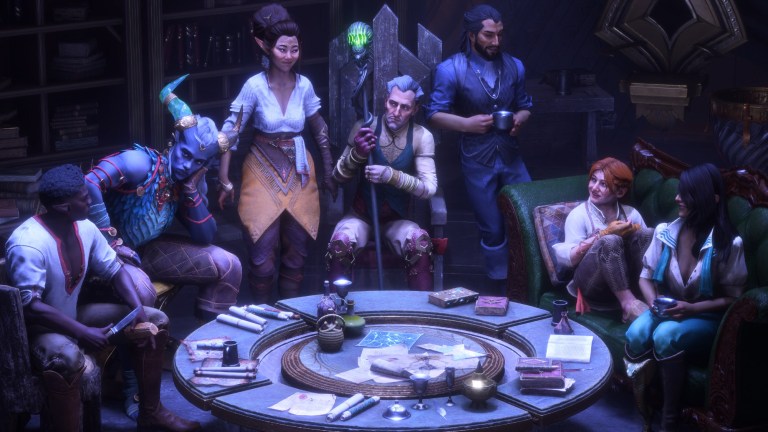BioWare Went Back to Basics With Dragon Age: The Veilguard, But Is It Really Enough?
A lot happened over at BioWare in the years leading up to the release of Dragon Age: The Veilguard, including multiple controversies. But is this the game that finally puts the legendary RPG studio back on the map?

The intro of Dragon Age: The Veilguard is something of a revelation. At the very least, it’s a poignant reminder that, when BioWare is in the zone, they are the best at what they do.
The game’s opener is one of the most spectacular things you’ll see in a video game this year. It sees new protagonist Rook accompanying Varric, a familiar face from Dragon Age: Inquisition, on a mission to stop Varric’s former Inquisition-mate Solas, a.k.a. The Dread Wolf, from tearing down The Veil, the barrier between Thedas and The Fade that he created long ago to lock away a slew of merciless Elven gods. There’s a lot of emotional baggage here—we learned at the end of Inquisition that Solas himself is an Elven god, not to mention he and Varric’s history as unlikely comrades. But the crux of it all is that Rook, Varric, and their allies are trying to stop Solas from causing a cataclysm that could unleash hell on Thedas and its people.
Running through Minrathous is a feast for the eyes. In the distance, Solas’s magical mayhem lights up the blackness of the rainy night sky with lightning bolts that reflect dramatically off the wet cobblestone streets. Fiery monsters pierce the darkness as they wreak havoc and prey on innocent bystanders, but there’s no time to help everybody—stopping Solas is the priority. And when the group finally reaches him, he and Varric have an emotionally charged encounter that makes the whole ordeal feel intensely personal.
What BioWare does so well here, and what they’ve done so well in the past, is combine the cinematic and satisfying gameplay in a seamless way where, whether the player is engaging in combat or watching a cutscene, they’re invested and engaged in the story that’s unfolding, with urgency, in every moment. It’s this hyper-curated, linear type of scene that made Mass Effect 2 so memorable, and Veilguard takes that sense of scale and spectacle to another level from its epic opening to its jaw-dropping finale. It’s an evolution, continuation, and in some ways an amalgamation of some of the best titles in the studio’s oeuvre, from the Dragon Age series itself, to the aforementioned Mass Effect 2, to Knights of the Old Republic.
In other words, BioWare has gone back to basics with its latest. Mass Effect: Andromeda was solid in many ways, particularly in the gameplay department, but it was a largely failed departure from what made the original trilogy so resonant with fans, namely its characters and setting. Anthem was an even bigger experiment for the studio, delving into the live service loot shooter genre for the first time. It was a novel concept at the time, and the game, like Andromeda, was actually a lot of fun to play at points. But content-wise, it was thin and repetitive. It just didn’t land with players, and with back-to-back disappointments on the studio’s record, the gaming community wondered if BioWare would ever recapture what made them, at one time, one of, if not the best RPG game studio on the planet.
Veilguard sees BioWare go back to what’s always worked. It expands and furthers the Dragon Age lore but streamlines and focuses the campaign to be more linear a la Mass Effect 2. And the drop-dead gorgeous environments are laid out in a way that recalls the organic level design of KOTOR. The voice acting is top-notch, the cutscenes are slick, the character work takes precedence (maybe the game’s greatest strength), and the dialogue trees feel more naturalistic and consequential than we’ve seen in any BioWare game before. By any and all measures, this is the ultimate BioWare experience for fans of what the studio did in its heyday.
A lot was riding on this game being not just good but embraced by the gaming community to the extent that BioWare could earn back the trust of its lapsed fans and draw the interest of new ones. The question is, is Dragon Age: The Veilguard good enough to bring BioWare “back?” It’s a genuinely tough call to make mere days after the game’s launch. From what we’ve played, the game is a terrific, blockbuster title that delivers on everything it promises and then some. It’s certainly good enough to stand comfortably alongside the best titles in BioWare’s catalog.
But that right there is likely to be an issue for some fans. BioWare has gone back to basics, but is their old recipe…too old? The game can feel dated depending on one’s tastes. For example, the game de-emphasizes some of the series’ RPG and dark fantasy roots in favor of a more hectic, action-game experience that felt fresh when Mass Effect 2 and Mass Effect 3 were released but isn’t nearly as novel now. While many gamers still share fond memories of Mass Effect and Dragon Age, there has been a new wave of more open-ended, open-world RPGs that have found big success in recent years (Baldur’s Gate 3, Elden Ring, Cyberpunk 2077). Linear, story-driven action games like 2018’s God of War seem to be a point of inspiration for Veilguard, and while we found this shift in design to imbue the game’s storytelling with more power than had ever been captured in previous Dragon Age titles, this may turn off those who were hoping for more freedom in gameplay.
The more pressing issue is if it’s even possible to offset BioWare’s years-long slump. Aside from its major titles underperforming, the studio has been fraught with controversies involving developer crunch at the studio, the departures of several key members of the team—many of whom were let go in the middle of Veilguard’s production—and, most recently, a right-wing-driven campaign to review bomb the new game by users aggrieved by the title’s perceived “woke” messaging. The thinly veiled true motives behind the hate campaign aside, conversations about the studio amongst the community haven’t been generally positive in recent years, and many fans had simply given up on the studio in the decade since their last great game.
The good news is, their last great game happens to be Dragon Age: Inquisition, which won Game of the Year at the 2014 Game Awards, along with several other accolades. Dragon Age: The Veilguard is a worthy direct sequel to that modern classic, and in many ways, it’s even better and more fully realized. BioWare, for all of the turbulence they endured getting here, have delivered a game that might not be for everyone, but is a high-quality product that earns its premium price point. Will it be enough to right the BioWare ship? Let’s hope so, for the sake of the industry and all of the hard-working folks over there.
No matter the outcome, Dragon Age: The Veilguard is emblematic of BioWare at its very best. Whether or not fans–many of whom have lost faith in the studio—are ready and/or willing to receive the game with open arms is another matter.
Dragon Age: The Veilguard is out now for PlayStation 5, Xbox Series X/S, and PC.
